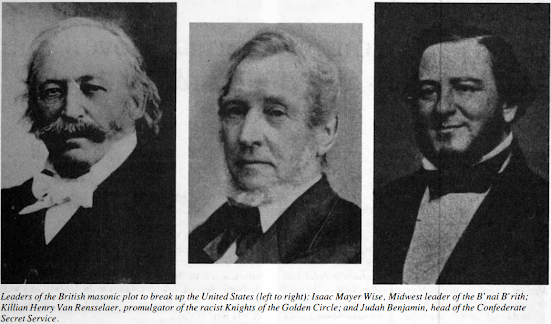In the B'nai B'rith's official, ,authorized history, it says: "B'nai B'rith' s relationship to the Civil War presents something of a mystery." They say. that the arrest of the B'nai B'rith's leader in Washington as a Confederate spymaster was unfair. They say that no one can account for why the group was not pro-Union, whereas most Jews were pro-Union, and B'nai B'rith's lodges were almost all located in the North. Indeed, Jewish soldiers in the Union Army were intensely proud, mostly German-speaking immigrant, antislavery Republicans.
To solve the mystery, we go back 20 years before the start of the American Civil War.
British Foreign Minister Palmerston launched Zionism in 1840. He wrote that the Jews desired to return to Palestine (Abba Eban points out that the Jews knew nothing about this); and a month later, the British landed troops in Palestine for the first time.
B'nai B'rith was started officially in 1843 by some obscure Freemasons in New York, as a secret society "like Freemasonry " for Jews. B'nai B'rith was to shape and lead a particular political faction, with a particular agenda, within the Jewish community.
The agenda for this project came out in a famous speech given two years later at South Carolina College. The speaker was Edwin DeLeon, from a Jewish family in South Carolina that was already notorious for its involvement in the slave trade and in Scottish Rite Freemasonry. DeLeon was later a leader of the Confederate Secret Service.
DeLeon praised his teacher at the school, Thomas Cooper, an English atheist and Lord Shelburne's adventurer, who had first proposed that the South secede from the Union. DeLeon hailed Cooper as a tender-hearted religious heretic and "an earnest ... disciple of the school of Bentham and Malthus."
DeLeon said, "There is a 'Young Germany,' a 'Young France,' and a 'Young England' - and why not a 'Young America'?" He told the students: Any great civil convulsion comes from a source that is unexpected and obscure. In the French Revolution, the priests and nobles were only the flax with which the flame was kindled. But those who first applied the spark were the filthy, obscure savants of the Enlightenment. DeLeon reminded the students that the actors in that drama were only its creatures, not its creators.
He then proposed revolutionary military action as the idea for his Young America, to spread what he called "freedom" - by force. (more...)
America's 'Young America' Movement: Slaveholders and the B'nai B'rith

No comments:
Post a Comment